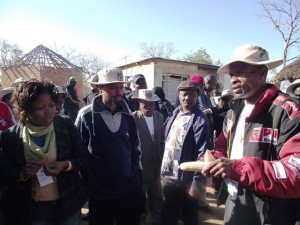Going agroecology, Zimbabwe villagers ditch chemical fertilizers, imported skills
Going agroecology, Zimbabwe villagers ditch chemical fertilizers, imported skills
In Topora village, Masvingo Province in Zimbabwe, farmers have successfully started practicing agroecology, a fist in the country.The crops they produce are completely organic, produced with local knowledge and traditional skills. This means they are not using chemical fertilizers or even imported production skills. This has become a source of pride and honour for the village.

The village shares a demonstration vegetable garden of agroecology where farmers learn and practice agro ecology collectively, called the Topora Demo field. It is an area of about a hectare, where farmers from different villages around Masvingo District meet at least twice a week to practice and exchange their agroecology knowledge.
Oliat Mauramba is one of those farmers. He goes to Topora every Tuesday and Friday to meet his “comrades” for the practices as well as to share what he learned from the workshops he used to attend outside the village.”I am one of the farmers who used to attend training workshops in Harare and other places. I have the responsibility to report back and share all the information with them,” said Mauramba who is one of the participants of the African Encounter on Agroecology, organized by La Via Campesina, in Masvingo.
So far, the Topora Demo Field has helped train farmers from at least 15 villages on agroecology since 2003. Organic farming is now used by about by about eight thousand farmers who are members of the Zimbabwe Small Holder Organic Farmer’s Forum, ZIMSOFF, a national organization, committed to the promotion of agroecology in the country and a member of ESAFF.”We grow our own seeds for the village and we multiply them,” explained Kumbirai Dekete, an older farmer who demonstrated how he works the land to a group of farmers from other African countries.In fact, more than 200 farmers have been supplied with native seeds from the Topora demo field since it was established.
In Topora, farmers grow diverse crops ecologically, like tomatoes, vegetables, spinach, rapes, sugar beans, herbs, tsunga and more. Part of the production is donated to the local hospital in Topora. ” We provide healthy organic food for the people who are ill in the hospital,” said Mauramba.
According to Elisabeth Mpofu, the president of ZIMSOFF, and Vice Chair of Eastern and Southern Africa small scale Farmers’ Forum (ESAFF), the demo fields are very useful because farmers easily adopt the knowledge and practice. “Currently in our country we have many of them. The greatest advantage is that the local market for organically grown products is steadily growing while we are in the process of also getting access to the certified organic markets for exportation,” she says.
While exports can help supplement farmers’ incomes, the greatest advantage of agroecological, according to the Via Campesina, is to provide abundant and healthy food for local people, what is called “Food Sovereignty.” (Story from LVC Communication Team in Africa)






















